-
 Art of Wellness Acupuncture & Traditional Chinese Medicine (TCM)11704 Wilshire Blvd, Suite 295, Los Angeles, CA, 90025
Art of Wellness Acupuncture & Traditional Chinese Medicine (TCM)11704 Wilshire Blvd, Suite 295, Los Angeles, CA, 90025
myartofwellness@gmail.com310-451-5522 Office Hours
MonClosedTue7:30 am --4 pmWed7:30 am --4 pmThu7:30 am -- 4 pmFri7:30 am -- 4 pmSat7:30 am -- 4 pmSunClosedOur office opens from Tuesdays to Saturdays 7:30 am to 4 pm, will be closed on Memorial day, Independent day, Labor day, Thanksgiving day, Christmas and New year.
-
Recent Posts
- Chinese New Year 2026: Year of the Horse
- Acupuncture and TCM Treatment for Perimenopause Symptoms
- How to Treat Insulin Resistance With Acupuncture and TCM
- How to Treat Metabolic Syndrome With Acupuncture and TCM
- How to Treat Syncope With Acupuncture and TCM
- How to Treat Thoracic Outlet Syndrome With Acupuncture and TCM
- How to Treat Dupuytren’s Contracture With Acupuncture and TCM
- How to Treat Nutcracker Syndrome With Acupuncture and TCM
- How to Treat Rosacea With Acupuncture and TCM
- How to Treat Perioral Dermatitis With Acupuncture and TCM
- Lymphatic Drainage With Acupuncture and TCM
- How to Treat Turf Toe With Acupuncture
- How to Treat Nerve Pain With Acupuncture and TCM
- How to Treat Watery Eyes With Acupuncture and TCM
- How to Treat Ovarian Cysts With Acupuncture and TCM
- How to Treat Dystonia With Acupuncture and TCM
- Sign up to receive news and updates and get my free report:“The Top 10 Reasons to Try Acupuncture”

December 2025 M T W T F S S 1 2 3 4 5 6 7 8 9 10 11 12 13 14 15 16 17 18 19 20 21 22 23 24 25 26 27 28 29 30 31
Stress & Anxiety
How To Help Dependence on Hydrocodone and Other Opioid Pain Medication With Acupuncture and TCM
By Qineng Tan, L.Ac., Ph.D. & Xiaomei Cai, L.Ac., Ph.D.
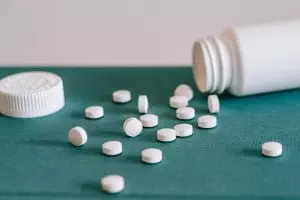
Many people are prescribed strong pain medication when they are in need of pain relief. Opioid drugs may help relieve pain, but they can also create a physical dependence as a person develops a tolerance for the painkillers. Acupuncture and TCM offer an alternative to opiate drugs and opioids like Codeine and Vicodin for treating pain, and a way to help treat both opioid dependence and addiction.
We often hear in the news that the U.S. is facing an “opioid epidemic.” Recent statistics suggest that over ten million Americans may have an opioid use disorder. CDC data showed that over 75,000 people died from opioid overdoses in 2021.
Some of the most commonly used pain medications include:
- Oxycodone (Oxycontin)
- Hydrocodone (Vicodin)
- Oxymorphone
- Morphine
- Methadone
- Fentanyl
- Codeine
- Tramadol
- Buprenorphine
Opioid medications are also known as “narcotics.” “Opiate” drugs are derived naturally from the poppy plant. These include: opium, codeine, and heroin. “Opioids” are synthetically produced in a lab. These include: oxycodone and fentanyl.
People are prescribed opioids or opiates to help them deal with severe pain, but the medications themselves can then become the primary cause of suffering in their lives. Roughly a quarter of people who are prescribed opioid pain medications end up misusing them.
Opioid misuse can mean different things, like: taking more than the prescribed dosage, using someone else’s medication, or continuing to take the medication even though it is having a negative impact on your health and life.
Dependence on opioids is different from addiction, and it is possible to experience drug dependence with or without also having a substance use disorder.
When a person becomes dependent on a medication, it means that they require a certain dose of that substance in order to avoid withdrawal symptoms. This is why these medications are closely monitored by the prescribing medical doctor, so that the dosage is carefully controlled. A person may need to be slowly weaned off the medications when they are no longer necessary, so as to avoid withdrawal.
It is also possible for a person to develop an addiction to opioids, as they stimulate the release of endorphins, which help to block pain signals and produce positive feelings. When this process is repeated over and over, the body starts producing less endorphins naturally, and a higher dosage of the opioid medication is required to produce the same effect; this is what we mean by “tolerance” to the drug.
Addiction to opioids—or an opioid use disorder—is more likely the longer a person takes them—for example, for a chronic pain condition. Other factors, like depression or anxiety, high levels of stress at work or home, and use of other substances like tobacco and alcohol, can also play a role in addiction risk.
It can be difficult, even for doctors, to distinguish between physical dependence and addiction. Addiction is usually defined by “abuse” or “misuse.” When a person feels that they cannot live without the medication, though, there is clearly a problem.
Acupuncture and TCM may play an important role in helping both individuals, and society as a whole, overcome dependence on opioid pain medications because it addresses the problem in several ways.
Top 10 Reasons Acupuncture Is a Good Alternative to Opioids for Pain Relief
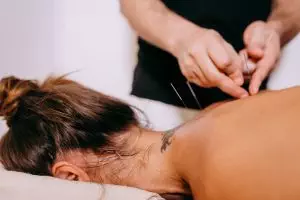
Acupuncture has a natural analgesic effect and can help relieve severe pain and chronic pain, without negative side effects.
- Acupuncture and other TCM modalities are an effective alternative for pain relief.
- Acupuncture can be used to treat both acute pain and chronic pain.
- Acupuncture can help reduce the need for opioid-like medications after surgeries, by helping relieve postoperative pain.
- Acupuncture and herbs can help postoperative wounds heal more quickly.
- Acupuncture can help cancer patients by providing pain relief and additionally helping to relieve nausea and mitigating other side effects of cancer treatment.
- Acupuncture provides pain relief without negative side effects.
- Acupuncture can help individuals who are trying to stop taking opiates avoid withdrawal symptoms.
- Acupuncture can help alleviate cravings for addictive substances.
- Acupuncture helps to effect the release of endorphins naturally, which provides the same good feelings as drugs initially do.
- Acupuncture can be a more cost effective way to treat pain and addiction than other methods.
Treatment for Opioid Dependence
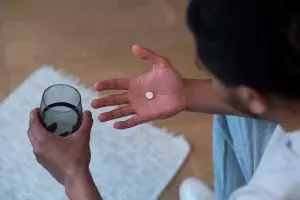
Methadone Maintenance treatment (MMT) is widely used to treat opioid addiction or dependence. This method involves replacing the opioid drug with methadone, which is a synthetic opioid, so it acts on the same centers of the brain, which helps to reduce cravings and withdrawal symptoms. This can help people wean themselves off of pain medications or heroin. However, there can be side effects, and MMT does not help everyone stop using or misusing opiates or prescription pain medications.
Long-term use of opioids can be detrimental to a person’s overall health, both mentally and physically. Hydrocodone side effects and oxycodone side effects can include: drowsiness, dizziness, nausea, vomiting, constipation, irregular heartbeat, and increased risk of respiratory problems for people with asthma or COPDs like emphysema or chronic bronchitis.
Mental health issues and opioid misuse often go together. People who suffer from depression or anxiety are much more likely to use opioids to treat pain and then become emotionally dependent on them.
Overall, evidence suggests that pharmacological methods for treating opioid misuse are not very successful. TCM and acupuncture offer an alternative treatment for opioid dependence.
Can Acupuncture Help Relieve Pain Better Than Opioids?
While there is still much to be done in the way of scientific research to demonstrate exactly how acupuncture is able to effect changes in the body and help relieve pain, there is ample enough evidence to convince the medical community that acupuncture does, indeed, have a significant analgesic effect. For two decades now, the WHO has recommended acupuncture and TCM for many different pain conditions, including:
- neck pain
- back pain
- low back pain
- Sciatica, hip pain
- postoperative pain
- headaches and migraines
- shoulder pain
- heel pain, plantar fasciitis
- TMJ pain
- Neuropathy pain
Acupuncture may work so well to relieve pain because it appears to have an effect on the central nervous system and opioid peptide neurotransmitters, including endorphins. This means that acupuncture works on the opioid receptors in the brain.
One study of patients who were in methadone treatment for opioid dependence found that people who received acupuncture were able to reduce the amount of methadone they needed.
A study on patients who had lumbar spine surgery to help severe back pain showed that acupuncture worked well as a postoperative analgesic.
Acupuncture Near Me for Pain Management and Opioid Dependence in Los Angeles
It is absolutely necessary for so many people to find pain relief when they have an acute condition, or a chronic pain condition, or are in treatment for cancer or other serious illness. Serious pain causes mental anguish as well as physical limitations. Acupuncture and TCM offer an alternative treatment for pain management that helps not only to block pain, but also to relieve stress and anxiety. At Art of Wellness, we have over 30 years of experience helping people to manage pain safely and effectively.
*This article is for education from the perspective of Traditional Chinese Medicine only. The education provided by this article is not approved by FDA to diagnose, prevent, treat and cure human diseases. It should not stop you from consulting with your physician for your medical conditions. Traditional Chinese Medicine is based on Qi, which is an invisible force that usually cannot be observed by modern science. Because science focuses on testing ideas about the natural world with evidence obtained through observation, these aspects of acupuncture can’t be studied by science. Therefore acupuncture and Chinese herbs are often not supported by double-blind, randomized trials, and they are considered alternative medicine therapies in the United States.
How to Treat Chronic Fatigue Syndrome With Acupuncture and TCM
By Xiaomei Cai, L.Ac., Ph.D. & Qineng Tan, L.Ac., Ph.D.
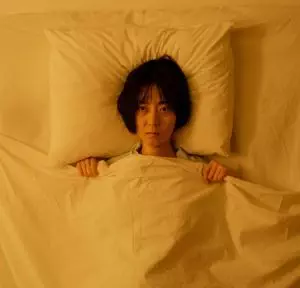
Chronic fatigue syndrome (CFS), also known as myalgic encephalitis (ME/CFS), is a condition marked by extreme fatigue that doesn’t get better, even with rest, and gets worse with physical and mental exertion. Chronic fatigue is not well understood by medical science, but acupuncture and Chinese medicine for chronic fatigue syndrome symptoms can be an effective treatment option.
People with chronic fatigue syndrome are always tired, even after getting a normal amount of sleep, and the condition persists for weeks, months, or years. Other chronic fatigue symptoms include body aches, cognitive problems, vision problems, and emotional or mental health problems, like depression and anxiety.
If a person feels tired all the time, with no medical explanation, for six months or more, and has several other chronic fatigue syndrome symptoms like dizziness, difficulty concentrating, headaches, or sensitivity to light, then they might be diagnosed with CFS, or myalgic encephalitis (ME CFS).
By definition, a syndrome is a collection of symptoms that often appear together in combination, for which the exact explanation is unknown. Chronic fatigue has been considered a syndrome for some time, but has more recently been given the designation of a “disease;” hence, the newer term “myalgic encephalitis,” which refers to muscle pain and inflammation of the brain and spinal cord.
Chronic fatigue syndrome symptoms can be very similar to those of fibromyalgia. People with fibromyalgia also experience severe fatigue, but the primary symptoms of fibromyalgia are musculoskeletal pain that comes and goes all over, especially in “tender points” around the major muscles and joints, along with swelling and inflammation. It is possible to have both ME/CFS and fibromyalgia.
Women are much more likely to have chronic fatigue than men. MECFS can begin to appear at any stage of life, but most usually develops in adulthood. It is estimated that up to 90% of people who have chronic fatigue go undiagnosed.
ME/CFS is a serious and disabling condition that can interfere with even the most basic daily activities. People with chronic fatigue may be able to participate in some events where they exert themselves mentally and/or physically, but afterwards, they will feel completely wiped out and have to take time to recover, often confined to bed. This is called post-exertional malaise (PEM).
Top 10 Chronic Fatigue Syndrome Symptoms
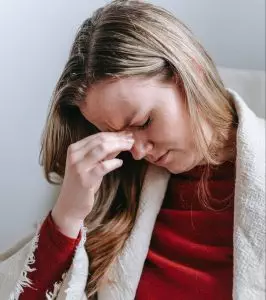
The most common ME/CFS symptoms include:
- Fatigue, tired all the time, weakness
- Sensitivity to light
- Trouble concentrating, hard to focus, memory problems, confusion
- Dizziness, especially when getting up from lying down
- Headaches
- Muscle aches, body ache, muscle weakness, joint pain
- Enlarged lymph nodes in neck or armpit area, sore throat
- Tired after exercise or mental exertion (post-exertional malaise)
- Depression, mood swings, moodiness
- Insomnia, sleep problems
Other signs of chronic fatigue syndrome may include: fever, abdominal pain, weight loss or weight gain, allergies, rash, rapid heart beat, and night sweats/hot flashes.
What Causes Chronic Fatigue?
The cause of ME/CFS is not known. Immune system dysfunction, the aftereffects of having a virus, and psychological factors have all been associated with the development of chronic fatigue.
Some people begin to have symptoms of chronic fatigue after having a viral infection, such as Epstein Barr, mononucleosis, or herpes. Postural orthostatic tachycardia syndrome (POTS) is also strongly associated with chronic fatigue.
While it does seem that some people who suffer from CFS also have immune system problems, chronic fatigue is not considered to be an autoimmune disorder in and of itself. As with other conditions like lupus or fibromyalgia, CFS sometimes appears after a person has gone through some sort of emotional trauma or physical injury.
Some people with chronic fatigue have hormone imbalances related to pituitary hormone, adrenal hormone, or hypothalamus hormones, but it is not understood how these might be related to their condition. Diabetes, anemia, or hypothyroidism can also create hormonal imbalances that can contribute to chronic fatigue.
In some cases, chronic fatigue could be due to a sleep disorder, such as sleep apnea or chronic insomnia. Long-standing mental health issues like depression, anxiety, or PTSD can interfere with sleep and hormone responses, contributing to the chronic fatigue syndrome symptoms.
Treatment for Chronic Fatigue Syndrome Symptoms

There is no clear treatment protocol within conventional Western medicine for ME/CFS. A doctor may diagnose myalgic encephalitis if they have ruled out other possibilities and then try to recommend medications or various types of therapy to help people deal with the symptoms of chronic fatigue.
Pain relievers or NSAIDs will often be the standard recommendation for handling ME/CFS related pain like headaches or muscles aches.
Doctors may prescribe antidepressants as a way of helping patients cope with depression and anxiety related to chronic fatigue. However, these medications can sometimes cause side effects that will exacerbate the chronic fatigue rather than helping it.
Some doctors have tried treating CFS with antiviral medications, corticosteroids, or thyroid hormone medications. None of the pharmacological interventions that have been used to treat chronic fatigue syndrome have proved to be very effective.
Thus, many patients with ME/CFS consider turning to alternative medicine or complementary therapies to relieve CFS symptoms. Acupuncture is now widely recognized as an alternative therapy for chronic fatigue.
Can Acupuncture and Chinese Medicine Help Chronic Fatigue Syndrome?
Traditional Chinese medicine is well suited to treatment for ME/CFS. Overall, TCM philosophy pays close attention to the subtle balance of energy, known as Qi, within the body as a whole, as well as within the various organ systems. By observing the specific symptoms each person experiences as part of chronic fatigue syndrome, we can pinpoint which organ systems are deficient and need strengthening.
Classic TCM patterns related to chronic fatigue diagnosis include:
- Spleen Qi deficiency
- Liver Qi stagnation
- Kidney deficiency
- Yin deficiency
- Heat toxicity
- Phlegm obstruction/dampness
Latent heat and dampness are sometimes the long-term effects of a viral infection or other illness, or a long period of emotional stress. These conditions originate from an external pathogenic factor, but then cause a series of imbalances which weaken the kidneys and other organs over time. Acupuncture treatment and herbs can help reduce inflammation and strengthen Qi.
A TCM doctor will choose acupuncture points and a combination of herbs that will help harmonize the affected systems. With herbs, we are able to get nutrients into the body beyond what you can do with foods alone. A balanced diet that cools heat and tonifies the organs will also be important for recovering strength and energy.
One controlled trial found that four weeks of acupuncture treatment led to improvements in CFS symptoms.
A systematic review of studies regarding acupuncture treatment for ME CFS showed a reduction in the severity of fatigue.
A study using acupuncture and moxibustion treatment for CFS showed a 90% effective rate, with half of the patients feeling that their CFS was “cured.”
Another study involving acupuncture and moxibustion found that the moxa treatment in particular became more and more effective as treatment sessions continued past the 10th treatment. Moxibustion was shown to have an effect on the vagus nerve, which controls the parasympathetic nervous system.
How long it takes to get results from acupuncture treatment for chronic fatigue will vary from person to person, depending on how long the person has been experiencing CFS, and how deeply the organ systems are affected. TCM treatment has a cumulative effect which strengthens over time and several sessions.
Acupuncture Near Me for Chronic Fatigue Syndrome (ME/CFS) in the Los Angeles Area
ME CFS is far more common than statistics show, because many people suffer in silence and invisibility. Now, many people are struggling with chronic fatigue after having COVID-19. TCM modalities like acupuncture, Chinese herbs, and moxibustion, can help relieve fatigue, depression, mental fogginess, poor sleep, and other symptoms of CFS. If you or someone you love has been feeling exhausted for months without improvement, it may be time to consider trying acupuncture for chronic fatigue.
*This article is for education from the perspective of Traditional Chinese Medicine only. The education provided by this article is not approved by FDA to diagnose, prevent, treat and cure human diseases. It should not stop you from consulting with your physician for your medical conditions. Traditional Chinese Medicine is based on Qi, which is an invisible force that usually cannot be observed by modern science. Because science focuses on testing ideas about the natural world with evidence obtained through observation, these aspects of acupuncture can’t be studied by science. Therefore acupuncture and Chinese herbs are often not supported by double-blind, randomized trials, and they are considered alternative medicine therapies in the United States.
How To Treat Claustrophobia Anxiety Disorder With Acupuncture and TCM
By Xiaomei Cai, L.Ac., Ph.D. & Qineng Tan, L.Ac., Ph.D.
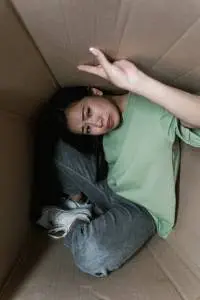
Claustrophobia is a specific kind of anxiety disorder in which fear of being in an enclosed space can bring on symptoms similar to those of panic attacks. Claustrophobic feelings like being anxious, hyperventilating, sweating, shaking, and rapid heartbeat can be eased with acupuncture and TCM.
Claustrophobia is actually quite common; at least 10% of people report experiencing some claustrophobic feelings. Women report having a fear of confined spaces more often than men do. Phobias are sometimes rooted in a childhood experience, but they can arise in anyone, at any age, and are considered mental health issues or psychiatric disorders.
Phobias are distinct from regular fears because of their intensity and, to some extent, irrational nature. Phobias are unreasonable fears; feeling very afraid, to the point of physical and emotional distress, of something that isn’t really happening. Claustrophobia becomes a serious mental health problem if it interferes with a person’s daily life or relationships.
Sometimes claustrophobia can get in the way of a person getting help for other health problems. For example, it may cause them to avoid undergoing an MRI. Some people might fear visiting a doctor’s office, which often means facing elevators, public restrooms, and other small rooms without windows. Some women report feeling claustrophobic during pregnancy, as if they are “trapped” inside their own bodies.
Other common triggers of claustrophobia include: airplanes, trains, tunnels, small cars, revolving doors, or amusement park rides with restraints. Even thoughts of having to be trapped in one of these situations can be enough to bring on symptoms of claustrophobia. Signs of claustrophobia can be similar to those of a panic attack.
Top 10 Symptoms of Claustrophobia:
- Sweating
- Shaking or trembling
- Trouble breathing
- Rapid heartbeat, fast heart rate, high blood pressure
- Tight feeling in chest, chest pain
- Flushed face, feeling hot
- Dizziness, feeling lightheaded or faint
- Ringing in ears, tinnitus
- Butterflies in stomach feeling, nausea, queasy feeling
- Numbness or tingling in parts of the body
Other signs of anxiety due to claustrophobia could include: dry mouth, difficulty swallowing, choking, chills, confusion, or disorientation. In addition to physical symptoms of panic, claustrophobia may cause a person to cry, yell, or to be overwhelmed by a desire to get out of a situation because they feel that they are in serious danger, even if it seems irrational.

Cleithrophobia is another type of anxiety disorder that is sometimes confused with claustrophobia. Cleithrophobia specifically refers to the fear of being trapped or confined with no way to escape. Claustrophobia is a fear of the small space itself. These two phobias can exist together. Either one could cause serious anticipatory anxiety, for example, if a person has to have an MRI.
Cleithrophobia is related to other “winter phobias,” which may include “cabin fever,” which is a sense that one is stuck inside, or a fear of being literally trapped in the ice or snow. Many people feel an extra sense of sadness or dread during the winter months; this kind of depression is known as SAD (seasonal affective disorder).
Over time, repeated panic attacks or bouts of intense anxiety brought on by claustrophobia can create long-term stress that is harmful to overall physical and mental health. Acupuncture and TCM offer an adjunct or alternative treatment for claustrophobia which can help reduce symptoms and offset the effects of stress.
What Causes Claustrophobia?
Phobias can be triggered by some event or experience in which a person felt endangered and was traumatized, similar to PTSD (post-traumatic stress disorder). Like other mental health conditions, claustrophobia is influenced by brain chemistry. Imbalances in the neurotransmitters in the brain can cause some people to experience symptoms of anxiety or panic attacks even if nothing scary is really happening. Then, they may associate those physical and emotional feelings with a specific place or situation, which causes the anxiety to be triggered whenever they approach that place or even think of that situation.
People can perceive things differently. One research study suggested that people with claustrophobia may have a different perception of how near something, like a wall, is to them. In other words, they underestimate distances, or their sense of “personal space” is different from other people’s.
The amygdala is the part of the brain that processes incoming sensory information from the environment and signals the autonomous nervous system if it detects danger. This is essentially the neurological pathway of fear. Some research has suggested that people who experience panic disorders are more likely to have a smaller-than-average amygdala.
Treatment for Claustrophobia
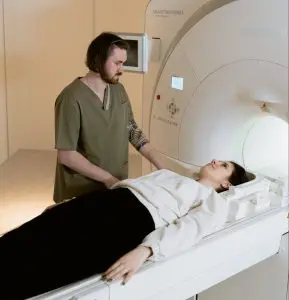
To be diagnosed with claustrophobia, a person will need to explain to their doctor that they have been having these intense feelings for a while and that they are having a negative impact on their lives. This could mean that they go out of their way to avoid certain places or situations. A mental health professional will try to determine whether these fears are normal, or could be attributed to some other condition.
Some doctors may prescribe SSRIs like Zoloft or Lexapro, which influence serotonin levels in the brain, to help patients who are suffering from claustrophobia or anxiety. Often therapy is recommended to help patients learn to cope with their feelings. Cognitive behavioral therapy (CBT) and/or exposure therapy aim to retrain the mind and may help people learn to get used to being in a small space without feeling so anxious.
Psychiatric medications can have unwanted side effects and may create a sense of dependence. Some people will avoid therapy because it can be very confronting and become another source of fear.
Acupuncture and other TCM modalities, including herbs and movement techniques like Tai Chi, may offer an alternative solution for panic attacks due to claustrophobia, without side effects or having to work through the problem with uncomfortable talk therapy sessions.
Can Acupuncture Help Claustrophobia?
According to TCM, the organ systems closely associated with fear are those of the kidneys, liver, and heart. Kidney deficiency, in particular, can cause fear and mental disturbances. These types of mental disorders can also be related to imbalances in Yin and Yang energies, and blood deficiencies. An acupuncture practitioner’s approach to treatment for claustrophobia may, therefore, focus on strengthening and nourishing the kidneys, while soothing the liver and heart.
One study compared patients who knew they had claustrophobic feelings going into an MRI; some were treated with acupuncture based on TCM acupoints. Control groups patients were given sham acupuncture (not really the points that would correspond with TCM theory). They concluded that the real acupuncture treatment did offer a therapeutic effect for claustrophobia, with a 92% rate of effectiveness; meaning, the patients were able to remain calm during the MRI.
A case study of a woman who had experienced bouts of claustrophobic symptoms since her teenage years, including shortness of breath, trembling, sweating, and loss of motor control in her hands and feet. After six acupuncture treatment sessions, she reported much improvement: feeling calmer, no headaches, palpitations, or anxiety. Chinese herbs can also be used, in conjunction with acupuncture treatment, help a person overcome claustrophobia.
Acupressure Points for Claustrophobia
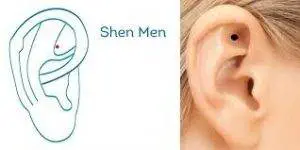
In between acupuncture sessions, you can use self-care acupressure to relieve claustrophobia.
Shen Men is a Master point, located in the valley of the upper part of the ear. This is a classic point to help feelings of anxiety.
Shoujie, which is located on the palm of the hand between the metacarpals of the fourth and fifth fingers, along the topmost crease, helps relieve palpitations and dizziness.
Acupuncture for Claustrophobia Near Me in Los Angeles Area
TCM is an excellent way for people to find relief from mental health issues of all kinds, including depression, anxiety, panic attacks, and phobias. We will do all we can to make sure that you are comfortable in one of our larger treatment rooms with a window, and to make your acupuncture treatment experience relaxing and pain-free. If you or someone you know is finding that the thought of enclosed spaces is creating anxiety in day-to-day life, please do not hesitate to try acupuncture for claustrophobia.
*This article is for education from the perspective of Traditional Chinese Medicine only. The education provided by this article is not approved by FDA to diagnose, prevent, treat and cure human diseases. It should not stop you from consulting with your physician for your medical conditions. Traditional Chinese Medicine is based on Qi, which is an invisible force that usually cannot be observed by modern science. Because science focuses on testing ideas about the natural world with evidence obtained through observation, these aspects of acupuncture can’t be studied by science. Therefore acupuncture and Chinese herbs are often not supported by double-blind, randomized trials, and they are considered alternative medicine therapies in the United States.
How to Detox With Acupuncture and TCM
By Xiaomei Cai, L.Ac., Ph.D. & Qineng Tan, L.Ac., Ph.D.
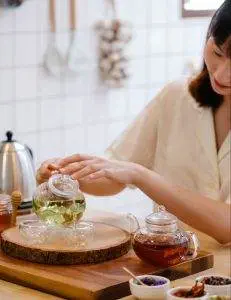
Why is it important to do a detox or body cleanse periodically? When done with the right support from an acupuncturist near me, detoxing can help improve your digestion, immune function, fertility, and many other aspects of your health. Store bought colon cleanse products or a juice cleanse won’t really do the job, though. A detox program with acupuncture and Chinese herbs will do more to optimize your health than just a detox diet will.
When we recommend our Detox Program at Art of Wellness, we are not talking about fasting or detox drinks, like a master cleanse. The goal of our program is to detoxify the organ systems of the body: it’s a liver detox, kidney cleanse, lungs, heart, and spleen. This is a full body cleanse designed to give you a health reset. According to TCM philosophy, your body knows how to repair and renew itself, but it cannot do this job when it is congested and out of balance.
In TCM, we have a broad concept of what “toxins” are and how they can affect our bodies and our health. Toxic chemicals that come from our environment, such as food additives, pesticides, cleaning products, and beauty and hygiene products are certainly part of the problem. Drugs, medicines, alcohol, and unhealthy foods can also be toxic. So can behavioral habits, like sitting and looking at our screens and devices too long.
But our own bodies produce toxins, too. The waste products our organs create are “toxic,” and if they are held in the body too long without being adequately cleared out, they can negatively impact organ function. Imbalances in the system can cause conditions of excess heat or phlegm, which can lead to all kinds of problems with both your physical and mental health.
Stress, lack of sleep, and extreme emotions can also contribute to toxic conditions in the body and mind. When the organ systems are out of balance, the body is under constant pressure to keep functioning, but we do not feel our best.
Signs you need to detox include:
- Fatigue, low energy, tired all the time
- Foggy head, memory problems, trouble concentrating
- Constipation
- Trouble sleeping, insomnia
- Weight gain
- Hair loss
- Hormone imbalances
- Signs of rapid aging
- Skin rash, acne
- Fingernails are brittle, lined or ridged
- Severe PMS symptoms or menopause symptoms
- Headaches, migraine
- Water retention, edema, swelling in extremities
Inflammation is largely created by toxic conditions in the body, and most pain conditions and chronic illnesses stem, at least in part, from inflammation somewhere.
Why You Need a Liver Detox
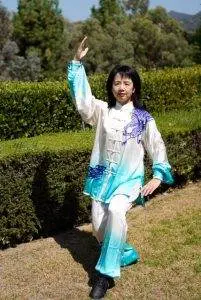
In conventional medicine, we think of the liver as being a sort of filter that removes toxins from the blood and helps metabolize fat. In TCM theory, we consider the liver to be the storehouse and distributor of blood; therefore, it also plays a crucial role in the menstrual cycle. The liver is also strongly connected to a person’s emotional life.
Stress, lack of sleep, too much sugar, alcohol, fatty, fried foods, pharmaceutical medicines, and recreational drugs all tax the liver above and beyond what it needs to do just to keep the blood flowing to nourish the body. When too many demands are placed on the liver, it can cause all kinds of symptoms, including: fatigue, insomnia, and headaches. Feelings of anger, frustration, anxiety, and irritability may arise. Conversely, when a person is feeling bitter and resentful, and isn’t able to express it, those unresolved emotions may begin to cause trouble with liver function.
Just as the liver governs the blood, in TCM, the kidneys govern the water of the body, controlling elimination through the bladder, and maintaining blood pressure by keeping the right amount of water in the bloodstream. Signs that the kidneys are not balanced include: problems with blood pressure, edema, puffiness in the face or extremities, UTIs, chronic fatigue, and menopause symptoms, like dryness and hot flashes.
Detoxing the organ systems, including the liver and kidneys especially, can help rejuvenate the digestion and allow better nutrition to reach all parts of the body, as the quality and flow of blood and other bodily fluids will be improved.
Making sure that your excretory system is in good working order before starting a cleanse is important. If you are already having problems with constipation, for example, we will want to make sure we get things moving before we start cleansing the organs. Our detox also focuses on the body’s largest excretory organ: the skin.
Top 10 Reasons To Detox
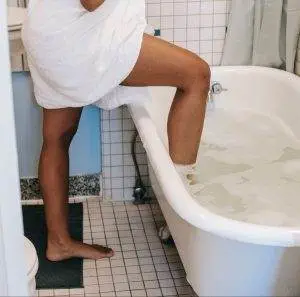
It is a good idea for everyone to detox periodically; detoxing every six months is reasonable for most people. Sometimes we will specifically recommend a detox for a patient when they are struggling with a particular health problem, or if they are planning a pregnancy.
Detoxing can help:
- Boost Immunity – a cleanse will help get your lymphatic system, which produces and transports immune cells and removes waste from cells, moving, improving the efficacy of your immune system.
- Break Free From Addiction – if you are ready, a commitment to the detox program and food plan can help you end patterns of substance abuse, drug use, alcohol addiction, smoking, and other types of dependency.
- Infertility – We often advise people who come to Art of Wellness for fertility treatment to begin with the Detox Program. Not only will this help increase the chances of conception occurring, whether naturally or with the aid of ART, but it will also lay the foundation for your child’s health in the future.
- Improve sleep – This works both ways. In order for the body to do its routine daily work of removing toxic waste, it needs plenty of sleep. The Liver, in particular, is working hard through the night to clean and deliver fresh blood to the cells. Sleeping on your side enhances your body’s ability to do this work, allowing the internal organs to drain properly. When your body is functioning well, your sleep will be of better quality, more restful and refreshing.
- Improve skin and hair – Dull eyes and skin, dark circles or bags, puffiness, and thinning hair are signs of stagnant blood and Qi. Nutrients from the right foods and Chinese herbs help to nourish the skin, and clear heat, dampness, and dryness. When old cells are removed, hair and eyes can shine again. Acupuncture treatment can help stimulate collagen production, which also happens while you sleep.
- Weight loss – While our acupuncture detox is not about how to lose belly fat fast, many people will find that it gives them a good foundation for new eating habits. Detoxing the liver and kidneys will help your body metabolize fat better.
- Balance hormones – severe PMS symptoms, bloated stomach and mood swings, perimenopause symptoms, infertility in women and infertility in men (oligospermia) can all be improved when hormone function improves. Acupuncture treatment can also help relieve conditions like PCOS, fibroids/leiomyoma, and endometriosis for women, and BPH in men.
- Reduce inflammation – many illnesses and pain conditions are inflammatory in nature. If you are suffering from pain due to plantar fasciitis, gout, rheumatoid arthritis, tennis elbow, carpal tunnel syndrome, shoulder or hip pain, acupuncture can help.
- Increased energy – better nutrition, better circulation, better sleep, and better organ function will all work synergistically to help you feel more energetic.
- Chronic illness – many chronic illnesses are rooted in toxic conditions within the body or exposure to toxins. Hard-to-treat conditions like autoimmune conditions and other systemic problems may be helped with alternative medicine when conventional medical treatments have not been successful. We treat many conditions with acupuncture and herbs, such as: lupus, lyme disease, celiac disease, fibromyalgia, and Crohn’s disease. We also provide support for people going through cancer treatment.
7 Steps of Detox Program With TCM Acupuncture and Herbs
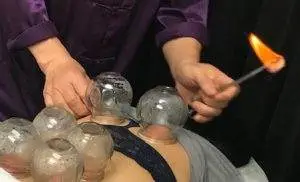
Pain and dysfunction occur when there is imbalance and when there are areas of stagnation within the body. Think of the metaphor of a house that needs to be deep-cleaned; there are dark corners of the body that have been ignored for a while, where dust and cobwebs have gathered. The Detox program reaches into these pockets of stagnation, sweeps them clean, and makes sure they get some fresh air and sunlight shining on them, in the form of invigorated Qi and blood.
- Acupuncture Treatments – the primary goal of acupuncture treatments during the detox phase is to get Qi moving freely, remove blockages, and to assist in elimination of toxins from the body.
- Cupping Treatment – the TCM modality of cupping creates a vacuum-like suction that moves Qi and blood from the innermost parts of the body outwards. During the detox program, cupping helps to pull toxins out of the lungs and other organs.
- Detox Herbs – the Chinese herb detox tea helps to clear heat and toxins from the body and improve digestion and elimination.
- Foot Pad Detox – detox foot patches, worn as you sleep at night and removed in the morning, help to pull toxins and fatty deposits from the body.
- Detox Bath – Sweating is an excellent way to remove toxins through the skin; this is why so many traditions rely on saunas and hot baths. Our herbal sachets allow you to enjoy a therapeutic herbal soak in your own bathtub.
- Exercise – Your acupuncturist will instruct you on how to practice daily exercises, based on QiGong movements, that will help to get Qi and blood moving.
- Nutrition – the food plan during the detox is based on whole grains, lean proteins, and plenty of vegetables, flooding your system with nutrients.
Detox Near Me Los Angeles, Westside
The beginning of the year, springtime, after recovery from a long illness, while preparing for a healthy pregnancy–anytime may be the right time for you to detoxify your system and get a fresh start. We recommend that you take the time to dedicate yourself to a week of cleansing with the Art of Wellness Detox Program at least twice a year for optimal health benefits.
*This article is for education from the perspective of Traditional Chinese Medicine only. The education provided by this article is not approved by FDA to diagnose, prevent, treat and cure human diseases. It should not stop you from consulting with your physician for your medical conditions. Traditional Chinese Medicine is based on Qi, which is an invisible force that usually cannot be observed by modern science. Because science focuses on testing ideas about the natural world with evidence obtained through observation, these aspects of acupuncture can’t be studied by science. Therefore acupuncture and Chinese herbs are often not supported by double-blind, randomized trials, and they are considered alternative medicine therapies in the United States.
How to Improve Mental Health With Acupuncture and TCM
By Xiaomei Cai, L.Ac., Ph.D. & Qineng Tan, L.Ac., Ph.D.
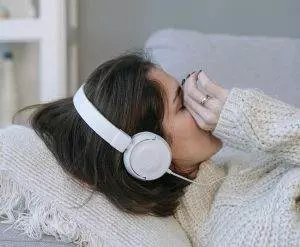
Mental health problems are becoming more and more prevalent, yet more than half of Americans experiencing mental illness do not get treatment. Mental disorders like depression, anxiety, panic attacks, PTSD, SAD (seasonal affective disorder), OCD, and postpartum depression can be improved with acupuncture and TCM, without negative side effects.
According to the most recent statistics, 19% of all adults in America are currently living with mental illness, while 15% of teenagers report having experienced major depression. Anxiety is the most common mental health condition, with 18% of the population reporting some form of anxiety disorder every year.
Addiction and substance abuse are also on the rise among both adults and teens. About 20% of people who have a mental disorder also have a problem with drug or alcohol addiction. Many people use drugs and alcohol to mask symptoms of depression and anxiety, but this only compounds the problem.
Mental health is about our emotions, our thoughts, and our relationships and social interactions with others. Mental health issues affect our behaviors, our thought patterns, and our responses to stress. TCM is an excellent form of care for mental health, because we take the whole person and their symptoms–mental, emotional, and physical–into consideration every time we work with them.
It is generally understood that mental health problems can come about due to a combination of factors, including imbalances in brain chemistry, trauma or abuse, and genetics or family history of psychological disorders.
Typical treatment for depression, anxiety, and other mental health problems involves talk therapy and/or prescription medications like antidepressants. Many people are not getting the relief they need from these forms of therapy, and medications can cause unwanted side effects, including headaches, nausea, weight gain, and trouble sleeping.
TCM takes a holistic approach to mental health and can help relieve signs of depression and anxiousness. TCM herbs and acupuncture can also provide an alternative treatment for many chronic illnesses that can contribute to depression.
Who Is At Risk for Depression, Anxiety, and Other Mental Disorders?
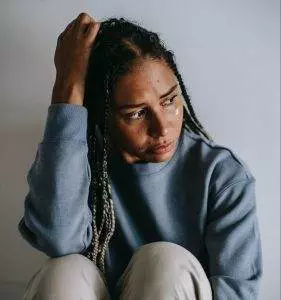
Everyone feels deep sadness and worry at times. When these feelings persist for a long time, they need to be addressed. Anyone, at any age, can experience symptoms of anxiety or depression. But some people are more at risk for mental health problems.
Risk Factors for mental illness include:
- Family history – if other people in your family have experienced mental illness, you may be more likely to have mental health issues, too.
- Stress – people who are going through financial insecurity, severe job stress, the loss of a loved one, or the breakup of a relationship are more likely to feel depressed.
- Trauma – having gone through a traumatic experience, such as abuse in a relationship, or being in an accident, or witnessing something terrible, can lead to feelings of depression, anxiety, or PTSD.
- Minority and marginalized communities – people who have experienced discrimination due to their race/ethnicity, gender, or sexual orientation are at a higher risk for mental health problems and often face extra barriers when they try to get help.
- Head trauma – having an injury to the head or brain can cause mental disorders.
- Chronic illness – having a longstanding serious illness or pain condition that dramatically impacts a person’s quality of life can lead to depression.
Medical science has been able to discern that certain imbalances in brain chemistry, including malfunctioning neurotransmitters in the brain and nervous system, are part of the physical root cause of depression, anxiety, and other mental disorders. Low serotonin, especially, is associated with a depressed mood, insomnia, panic attacks, obsessive-compulsive disorder (OCD), and even suicidal ideation. This is why the medical solution for depression and anxiety is often prescription medications like SSRIs, which impact the levels of serotonin in the brain.
Acupuncture and other TCM treatments can also have a positive effect on neurochemistry, without the dependence or side effects that medications can cause.
Can Acupuncture Help Mental Health Problems?
TCM has become more and more accepted by the scientific community as an effective way to relieve depression, anxiety, PTSD, and other mental disorders.
The Five Elements Theory used in TCM allows us to link physical, emotional, and mental symptoms of depression and anxiety and see specific patterns.
A medical doctor or therapist may hear that a patient has headaches, gastric upset, sleep problems, and episodes of anger, and view these as separate symptoms, treatable by separate medications. The acupuncturist sees a pattern that points to a particular imbalance in the organ systems.
TCM can help many mental health issues, including:
- Depression – according to TCM, depressed mood is usually related to some form of stagnation in the Qi of the liver, kidney, spleen, and/or heart. Feelings of grief are associated with the lungs.
- Anxiety – Depression with anxiety is often due to a deficiency of Yin, which can cause sleep problems, back pain, and irritability. Excessive worrying is related to the spleen. Studies have indicated that acupuncture treatment facilitates the release of serotonin, endorphins, and norepinephrine, which can help to calm feelings of anxiety, even immediately after treatment.
- Panic Attacks – TCM can help people with panic disorders. The intense feelings of fear that can come on with a panic attack may be related to the kidneys, which are involved in the release of adrenaline and cortisol, the “fight or flight” hormones.
- PTSD – Sometimes people suffering from PTSD or other trauma-related mental health problems are unable to go through talk therapy in order to deal with their feelings. There can be all kinds of reasons why a person is not able to speak about abuse or horrors they have suffered. Acupuncture treatments offer a real solution to ease the heavy feelings. A TCM provider offers healing by being able to sense a person’s energy, and facilitate shifts in that energy.
- SAD – Some forms of depression are temporary, but that doesn’t mean that they aren’t serious or don’t require attention. Seasonal affective disorder (SAD) affects many people, year after year. Acupuncture can help prevent this cycle from recurring.
- PMS/PMDD – People who menstruate often experience PMS (premenstrual syndrome), which can have emotional and mental symptoms. PMDD, an extreme form of PMS, can cause severe feelings of depression and even suicidal ideation. Acupuncture and herbs are an excellent way to address all kinds of problems with the menstrual cycle, including intense mood swings.
- Postpartum Depression – Many women experience depression during pregnancy and postpartum depression after having given birth. This condition, brought on by dramatic changes in hormones, can affect a new parent’s ability to care for themselves and their baby. Acupuncture treatment can effectively address postpartum depression, without fear of side effects from drugs.
- ADD/ADHD – ADD/ADHD are mental health disorders that affect a person’s ability to concentrate and can cause hyperactivity, mood swings, and social problems. Acupuncture and TCM can help both adults and children who are having problems with attentiveness, frustration, and restlessness.
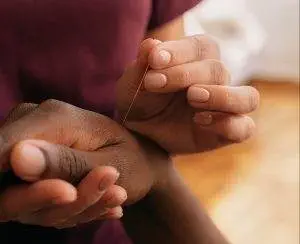
Acupuncture can also help people who are struggling with substance abuse and addiction. Addictive behaviors are related to brain chemistry, and acupuncture can be utilized as an effective treatment for symptoms of withdrawal and as support for the mental and emotional aspects of recovery from alcohol or drug addiction.
Many people who are living with serious chronic illnesses also suffer from depression. When a health condition impacts a person’s quality of life every day, it can feel defeating and exhausting.
Neurological disorders that affect the brain, such as Alzheimer’s, dementia, and Parkinson’s disease, can create feelings of anger and frustration, bringing about changes in personality.
Autoimmune disorders like Crohn’s disease, Rheumatoid arthritis, ME/CFS (chronic fatigue syndrome), Lyme disease, MS (multiple sclerosis), and Lupus–can also engender feelings of depression because it can be so difficult to find treatment for their symptoms. People with serious conditions like HIV/AIDS and ALS are also apt to suffer from depression. Acupuncture and TCM not only provide help for the depression, but may be able to provide an adjunct or alternative treatment for these conditions, providing long-sought relief from symptoms and frustration.
Acupuncture Near Me For Mental Health Care in Los Angeles
If you or someone you know is suffering from mental illness, consider acupuncture as an alternative or adjunct to therapy and medications. People with mental health issues need a support system. At Art of Wellness in West LA, we have over 30 years of experience helping people find relief from the emotional, mental, and physical symptoms of anxiety and depression.
*This article is for education from the perspective of Traditional Chinese Medicine only. The education provided by this article is not approved by FDA to diagnose, prevent, treat and cure human diseases. It should not stop you from consulting with your physician for your medical conditions. Traditional Chinese Medicine is based on Qi, which is an invisible force that usually cannot be observed by modern science. Because science focuses on testing ideas about the natural world with evidence obtained through observation, these aspects of acupuncture can’t be studied by science. Therefore acupuncture and Chinese herbs are often not supported by double-blind, randomized trials, and they are considered alternative medicine therapies in the United States.